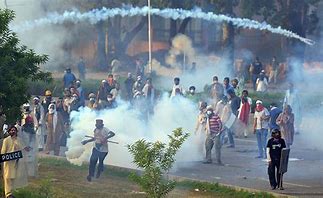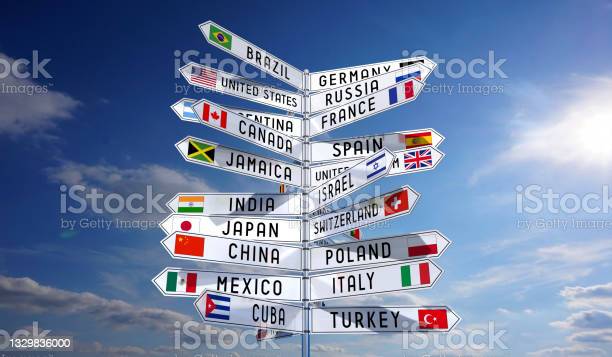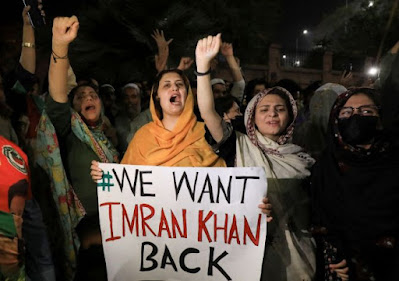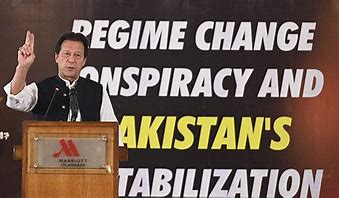In an increasingly interconnected world, the phenomenon of transnational repression has emerged as a concerning threat to global democracy. Transnational repression refers to the actions taken by governments to target and intimidate individuals who have fled their home countries, often crossing borders to silence dissent and suppress political opposition. This form of repression goes beyond national boundaries and poses a serious challenge to the principles of democracy and human rights on a global scale.
A Report by Freedom House
A report by Freedom House (February 2021) sheds light on the alarming rise of “transnational repression,” wherein authoritarian governments employ violence against activists, dissidents, and their families even after they have fled abroad. The report titled “Out of Sight, Not Out of Reach” presents key findings that highlight the scale and impact of this phenomenon.
The report documents at least 608 cases of direct, physical transnational repression since 2014, involving tactics such as assassinations, abductions, assaults, detentions, and unlawful deportations. These actions have affected an estimated 3.5 million people worldwide, leading to a pattern of violence and intimidation targeting individuals living abroad.
Shocking Revelations about Transnational Repression
It is revealed that at least 31 origin states on every inhabited continent have carried out transnational repression in 79 host countries, including well-established democracies like the United States and the United Kingdom. This global issue poses significant challenges to human rights and democratic values.
The report examines different forms of transnational repression, including coercion by proxy, mobility controls (such as passport cancellations), and digital threats like spyware and online smear campaigns. While direct attacks pose physical danger, other tactics of intimidation and coercion can effectively silence exiles, restricting their ability to speak freely.
Most cases of transnational repression involve some level of cooperation between the origin and host states, evident in detentions, deportations, and renditions.
The report emphasizes the need to address how origin states manipulate migration and asylum systems to target fleeing individuals, particularly using accusations of terrorism. Approximately 58 per cent of the documented cases involved such accusations.
Freedom House’s analysis includes detailed case studies on six leading states practising transnational repression: China, Rwanda, Saudi Arabia, Iran, Russia, and Turkey. These countries employ diverse strategies to silence exiles, with each case study shedding light on the regime’s motives, tactics, and the experiences of those targeted.
In China, the campaign is vast and targets a wide range of groups, including ethnic and religious minorities, former Communist Party insiders, human rights defenders, and individuals from Hong Kong. Rwanda‘s transnational repression has been a long-standing pillar of President Paul Kagame’s rule, affecting almost all Rwandans abroad. Russia focuses on former insiders seen as threats and launches campaigns against Chechens challenging pro-Kremlin leadership. Saudi Arabia utilizes spyware, family intimidation, detentions, assaults, and renditions against exiles globally. Iran has resumed attempted assassinations and renditions of exiles in recent years, while Turkey has engaged in a global rendition campaign since the 2016 coup attempt.
The report concludes that combating transnational repression requires addressing cooperation between origin and host states, scrutinizing migration and asylum systems, and protecting individuals from authoritarian regimes. Stopping transnational repression is essential for safeguarding democracy and countering authoritarian influence worldwide.
Transnational Repression Under PDM Regime
During the current PDM (Pakistan Democratic Movement) regime in Pakistan, the issue of transnational repression has taken on greater significance. The PDM regime’s approach towards exiles and dissenters has been marked by coercion and violence, reaching beyond Pakistan’s borders to target individuals who have sought refuge abroad. This not only violates the rights of those targeted but also has a chilling effect on freedom of speech and expression for other members of the diaspora.
PDM Regime is Unaware of New US Policy about Translational Repression
In recent years, the US government has taken decisive measures to counter the malicious actions of foreign governments, implementing new security protocols and foreign policy strategies. Key agencies like the Justice Department, FBI, and Departments of Homeland Security and State have played vital roles in this response. Their efforts include tracking incidents, publicizing information about the tactics employed, and issuing indictments. Despite these robust actions, certain gaps persist. Specifically, the United States lacks dedicated legislation aimed at addressing transnational repression, and the existing immigration system falls short of providing adequate protection for vulnerable individuals. To bolster its response, the US can further refine and strengthen foreign policy tools, such as sanctions and visa bans, to substantially increase the consequences faced by perpetrators of transnational repression. It appears that the PDM regime is not aware of this fact and is unwilling to grant freedom of speech to Pakistani citizens living abroad.
Laws to Protect Transnationals
International and national laws designed to protect transnationals, including those from countries like Pakistan, aim to safeguard individuals from transnational repression. Here are some important laws and conventions that contribute to this protection:
International Laws and Conventions:
- Universal Declaration of Human Rights (UDHR) (1948):
- Article 9: No one shall be subjected to arbitrary arrest, detention, or exile.
- Article 14: Everyone has the right to seek and to enjoy in other countries asylum from persecution.
- International Covenant on Civil and Political Rights (ICCPR) (1966):
- Article 12: Everyone lawfully within the territory of a State shall have the right to liberty of movement and freedom to choose his residence.
- Article 19: Everyone shall have the right to hold opinions without interference. Everyone shall have the right to freedom of expression.
- Convention against Torture and Other Cruel, Inhuman or Degrading Treatment or Punishment (1984):
- States are obliged to take effective measures to prevent torture and must ensure that victims of torture obtain redress and have an enforceable right to fair and adequate compensation.
- 1951 Refugee Convention and its 1967 Protocol:
- Defines who is a refugee and sets out the rights of individuals who are granted asylum and the responsibilities of nations that grant asylum.
National Laws:
- U.S. Magnitsky Act (2012):
- Allows the U.S. government to sanction foreign government officials worldwide who are deemed to be human rights offenders, freeze their assets, and ban them from entering the U.S.
- U.S. Global Magnitsky Human Rights Accountability Act (2016):
- Expands the Magnitsky Act to address human rights abuses and corruption globally.
- European Union’s Sanctions Regime on Human Rights Violations (2020):
- Allows the EU to target individuals, entities, and bodies responsible for, involved in, or associated with serious human rights violations and abuses worldwide.
Regional Human Rights Instruments:
- European Convention on Human Rights (ECHR) (1950):
- Protects human rights and fundamental freedoms in Europe. It includes the right to freedom of expression (Article 10) and the prohibition of torture (Article 3).
- American Convention on Human Rights (1969):
- Similar to the ECHR, it protects a wide range of civil and political rights in the Americas.
Mechanisms and Bodies:
- United Nations Human Rights Council (UNHRC):
- An inter-governmental body is responsible for strengthening the promotion and protection of human rights around the globe and addressing situations of human rights violations.
- Office of the United Nations High Commissioner for Refugees (UNHCR):
- Protects and supports refugees at the request of a government or the UN and assists in their voluntary repatriation, local integration, or resettlement to a third country.
These laws and mechanisms help protect individuals from transnational repression and ensure they have the right to live freely and express themselves without fear of persecution, regardless of their country of origin.
The Global Impact of Transnational Repression
Transnational repression is not limited to Pakistan alone; dozens of governments around the world have been implicated in similar practices. The systematic employment of violence against exiles and diasporas demonstrates how some governments resort to extreme measures to silence dissent, even if it means violating the sovereignty of other nations. This global impact demands urgent attention and concerted efforts to combat such repressive practices.
Notable Cases and Broader Implications
China’s Targeting of Uyghurs and Dissidents Abroad:
- The Chinese government has been implicated in transnational repression, particularly targeting Uyghur Muslims and political dissidents living abroad. Reports have surfaced of Uyghurs being harassed, intimidated, and coerced into spying on their communities or returning to China. Some have faced threats to their families back home, and there have been instances of forced repatriation from countries like Egypt and Turkey.
Russia’s Campaign Against Political Opponents:
- Russia has a long history of targeting political opponents and critics abroad. High-profile cases include the poisoning of former spy Sergei Skripal and his daughter in the UK in 2018, and the assassination of exiled Russian politician Boris Nemtsov in 2015. These actions demonstrate Russia’s willingness to use lethal measures to silence dissent on foreign soil.
Saudi Arabia’s Extraterritorial Actions:
- The murder of journalist Jamal Khashoggi in the Saudi consulate in Istanbul in 2018 is a stark example of transnational repression. Khashoggi, a vocal critic of the Saudi government, was brutally killed, highlighting the lengths to which the Saudi regime will go to suppress dissent and control its narrative globally.
Iran’s Persecution of Dissidents:
- Iranian intelligence services have been involved in the harassment, abduction, and assassination of Iranian dissidents abroad. For instance, in 2020, Iranian dissident Ruhollah Zam was abducted in Iraq and brought back to Iran, where he was executed. Such actions underscore Iran’s aggressive stance towards silencing critics, even beyond its borders.
Turkey’s Crackdown on the Gülen Movement:
- Following the failed coup attempt in 2016, the Turkish government has pursued members of the Gülen movement globally. This includes pressuring other countries to shut down Gülen-affiliated schools and organizations, as well as extraditing individuals accused of being involved in the coup. Countries like Pakistan and Kosovo have faced diplomatic pressure to comply with Turkey’s demands.
Egypt’s Repression of Political Opponents:
- The Egyptian government has targeted political dissidents, particularly members of the Muslim Brotherhood, who have fled abroad. This includes instances of enforced disappearances, arbitrary detentions, and threats to family members in Egypt. These actions are part of a broader strategy to eliminate opposition voices.
Examples of Transnational Repression in European and Other Developed Countries
Transnational repression is not confined to any particular region; even developed countries in Europe and beyond have witnessed incidents where foreign governments have targeted exiles and dissidents on their soil. Here are some notable examples:
- Alexander Litvinenko (United Kingdom, 2006):
- Alexander Litvinenko, a former Russian FSB agent and outspoken critic of the Kremlin, was poisoned with polonium-210 in London. An investigation concluded that his murder was likely approved by the Russian state. This case highlighted the reach and ruthlessness of Russian operatives in targeting dissidents abroad.
- Jamal Khashoggi (Turkey, 2018):
- Although Turkey is not a developed country by some definitions, the incident had significant international repercussions involving developed nations. Saudi journalist Jamal Khashoggi was murdered inside the Saudi consulate in Istanbul. The assassination was widely condemned and underscored the lengths to which the Saudi regime would go to silence critics, even within foreign diplomatic missions.
- Murder of Chechen Exiles in Germany:
- In 2019, Zelimkhan Khangoshvili, a former Chechen rebel commander, was assassinated in Berlin. German authorities suspected Russian state involvement, and the incident strained diplomatic relations between Germany and Russia. This assassination was seen as part of a broader pattern of targeting Chechen dissidents in Europe.
- Iranian Dissidents in Denmark:
- In 2018, Danish authorities accused Iran of plotting an assassination on Danish soil, targeting an exiled leader of the Arab Struggle Movement for the Liberation of Ahvaz. The revelation led to diplomatic tensions and increased scrutiny of Iranian activities in Europe.
- Rwandan Exiles in the United Kingdom and the Netherlands:
- There have been multiple reports of Rwandan exiles being targeted for assassination in European countries. For instance, in 2011, Rwandan dissidents in the UK and the Netherlands received warnings from local authorities about credible threats to their lives, allegedly orchestrated by the Rwandan government.
- Chinese Repression of Uyghurs in the United States:
- While not a European country, the US has also faced issues of transnational repression. Chinese authorities have been reported to harass and intimidate Uyghur activists and their families in the United States. These tactics include threats to relatives in China and pressure to cease political activities.
- Turkey’s Pursuit of Gülenists in the United States:
- Following the 2016 coup attempt in Turkey, the Turkish government has aggressively pursued members of the Gülen movement, whom it blames for the coup. In the US, there have been reports of surveillance, intimidation, and attempts to pressure American authorities into extraditing Gülen-affiliated individuals.
India’s Targeting of Dissidents Abroad
India, like several other nations, has been reported to engage in transnational repression, targeting dissidents and critics beyond its borders. Here are some examples and incidents illustrating this practice:
- Sikh Activists and Khalistani Supporters:
- Sikh activists and supporters of the Khalistan movement, advocating for a separate Sikh homeland, have reported harassment and intimidation by Indian authorities abroad. Countries such as Canada and the UK, with significant Sikh populations, have seen incidents where activists allege surveillance and threats orchestrated by Indian operatives.
- Kashmiri Separatists:
- Individuals advocating for Kashmiri independence or autonomy have also faced threats and intimidation. In the US and Europe, Kashmiri activists have reported being followed, harassed, and receiving threats against their families in India.
- Human Rights Activists:
- Human rights activists critical of India’s policies in regions like Kashmir and northeastern states have been targets of surveillance and harassment. These activists often report online threats and campaigns aimed at discrediting their work.
- The Case of T. S. Tirumurti:
- In 2020, T. S. Tirumurti, then India’s Permanent Representative to the United Nations, was accused of attempting to silence and discredit critics of India’s policies in international forums. While this is more diplomatic than physical repression, it illustrates India’s efforts to manage its image and silence dissent on the global stage.
Methods of Targeting
- Surveillance and Monitoring:
- Indian authorities have been accused of monitoring the activities of dissidents through consulates and embassies. This includes attending events, taking photographs, and keeping tabs on activists’ movements.
- Threats and Intimidation:
- Dissidents often receive threats via phone calls, social media, or through intermediaries. These threats may extend to family members back in India, creating a climate of fear and pressure to cease their activities.
- Diplomatic Pressure:
- India has been known to exert diplomatic pressure on host countries to act against dissidents. This includes requesting extradition or deportation and using diplomatic channels to influence host countries’ policies towards these individuals.
- Cyber Harassment:
- Online harassment and disinformation campaigns are common tactics. Indian dissidents abroad frequently report coordinated online attacks aimed at discrediting them and their work.
Notable Incidents
- Canada:
- Canada, home to a significant Sikh population, has seen numerous reports of Indian authorities targeting Sikh activists. In 2020, a Canadian Sikh leader reported receiving death threats linked to his advocacy for Khalistan.
- United Kingdom:
- UK-based Kashmiri and Sikh activists have reported harassment and surveillance. In 2021, a prominent British Sikh activist received multiple death threats allegedly linked to his advocacy work.
- United States:
- The US has seen incidents where Indian human rights activists and journalists have faced intimidation. In 2019, an American citizen of Indian origin reported being harassed for his support of Kashmiri independence.
USA Attempted Transnational Repression
In recent years, there have been instances and accusations where the United States has been implicated in actions that could be considered transnational repression. These incidents often involve surveillance, harassment, and legal actions against individuals abroad. Here are some examples and contexts:
Surveillance and Monitoring
- Edward Snowden (2013):
- Edward Snowden, a former NSA contractor, leaked classified information about the U.S. government’s mass surveillance programs. After fleeing the U.S., Snowden sought asylum in several countries and eventually ended up in Russia. The U.S. government has been relentless in seeking his return to face charges, illustrating its far-reaching efforts to control dissent and whistleblowing.
Harassment and Legal Actions
- Julian Assange:
- Julian Assange, the founder of WikiLeaks, faced charges in the U.S. for publishing classified military and diplomatic documents. Assange took refuge in the Ecuadorian embassy in London for several years to avoid extradition to the U.S. His case highlights the U.S. government’s aggressive pursuit of individuals who release sensitive information, which can be seen as a form of repression against whistleblowers and activists abroad.
Covert Operations and Influence
- Overseas Covert Actions:
- The U.S. has a history of covert operations that have sometimes included attempts to influence or destabilize foreign governments and political movements. While not always framed as direct repression of dissidents, these actions can involve undermining or targeting individuals deemed threats to U.S. interests.
Diplomatic Pressure
- Pressure on Host Countries:
- The U.S. has exerted diplomatic pressure on other countries to extradite individuals accused of crimes against U.S. laws or interests. This includes efforts to secure the extradition of individuals accused of cybercrimes, terrorism, or other offenses. While this is often legal and part of international cooperation, it can also be seen as a form of transnational control over dissidents and activists.
The Broader Implications
The global nature of transnational repression has far-reaching implications:
- Erosion of Sovereignty: These actions often violate the sovereignty of host nations, undermining their legal and political systems. This creates diplomatic tensions and can strain international relations.
- Chilling Effect on Free Speech: Transnational repression creates a climate of fear among exiles and diasporas, deterring them from exercising their right to free speech and political activism. This undermines democratic principles and stifles dissent.
- Human Rights Violations: The use of violence, intimidation, and coercion against individuals abroad constitutes serious human rights violations. It also reflects a broader disregard for international law and norms.
- Need for Global Response: Addressing transnational repression requires coordinated international efforts. This includes stronger legal frameworks, better protection mechanisms for exiles and diasporas, and increased diplomatic pressure on offending states.
- Legal and Diplomatic Challenges: These incidents create complex legal and diplomatic challenges for host countries, as they must balance national security concerns with the protection of human rights and sovereignty.
- Strain on International Relations: Cases of transnational repression often lead to diplomatic strains and require a coordinated international response to hold offending states accountable.
- Public Awareness and Policy Changes: High-profile cases raise public awareness about the issue and can lead to policy changes aimed at better-protecting exiles and dissidents, such as improved asylum procedures and enhanced security measures.
- The Case of Chelsea Manning:
- Chelsea Manning, a former U.S. Army intelligence analyst, was imprisoned for leaking classified information to WikiLeaks. Although Manning was pardoned, her treatment raised significant concerns about how the U.S. government handles whistleblowers and the implications for those who might seek asylum abroad.
- International Reactions:
- The U.S.’s actions have often drawn international criticism, particularly from human rights organizations and foreign governments, who argue that these actions can infringe on the rights of individuals to seek asylum and protection from political persecution.
While the United States often positions itself as a defender of human rights and democratic values, its actions in pursuing whistleblowers, activists, and dissidents abroad have raised questions about the extent to which it engages in transnational repression. The balance between national security interests and respecting international norms and human rights remains a contentious and complex issue.
Challenges in Combating Transnational Repression
One of the significant challenges in addressing transnational repression lies in the lack of international cooperation. Some countries may be reluctant to intervene in the internal affairs of others, even when grave human rights violations are occurring. Additionally, protecting the rights of exiles presents legal and logistical complexities, especially when their home countries exert considerable pressure on the host nations.
Misuse of International Protection Laws
To avoid the misuse of international protection laws by individuals such as terrorists, blasphemers, or traitors seeking refuge, various organizations and countries have implemented measures to close these loopholes. Here are some of the key measures taken:
Screening and Vetting Processes:
- Thorough Background Checks:
- Countries and organizations conduct extensive background checks on asylum seekers and refugees to identify individuals with ties to terrorist activities or serious criminal conduct.
- Interagency Coordination:
- Collaboration between different national and international agencies (such as intelligence, law enforcement, and immigration agencies) helps share information about individuals posing a security threat.
- Watch Lists and Databases:
- Utilizing databases such as Interpol’s databases, national security watch lists, and other international lists to screen asylum seekers and refugees.
Legal Frameworks:
- Exclusion Clauses:
- Under the 1951 Refugee Convention and other international laws, there are exclusion clauses that deny refugee status to individuals involved in war crimes, crimes against humanity, or other serious non-political crimes.
- Anti-terrorism Legislation:
- National and international laws specifically address the denial of protection to individuals involved in terrorist activities. For instance, the U.S. Patriot Act includes provisions to prevent terrorists from abusing the asylum system.
Specialized Units and Procedures:
- Specialized Immigration Units:
- Countries often have specialized immigration units trained to identify and handle cases involving potential security threats.
- Enhanced Interview Techniques:
- Immigration officers are trained in advanced interviewing techniques to detect inconsistencies and identify potential threats during the asylum application process.
International Cooperation and Agreements:
- Information Sharing:
- Countries and international organizations share intelligence and information on suspected terrorists and criminals to prevent them from exploiting the asylum system.
- Joint Operations:
- Conducting joint operations to monitor and manage the flow of refugees and asylum seekers, particularly in regions with high security risks.
Monitoring and Enforcement:
- Regular Monitoring:
- Continuous monitoring of the activities of refugees and asylum seekers within host countries to detect any involvement in criminal or terrorist activities.
- Deportation and Extradition:
- Agreements and mechanisms for deporting or extraditing individuals found to be involved in criminal or terrorist activities, ensuring they face justice in their home countries or elsewhere.
Community and International Programs:
- Community Reporting Systems:
- Encouraging communities to report suspicious activities among refugees and asylum seekers to authorities.
- Capacity Building:
- Programs to strengthen the capacity of countries to effectively manage their asylum processes and screen for security threats.
Legal and Judicial Measures:
- Revocation of Asylum:
- Legal provisions to revoke asylum status if an individual is found to have committed a serious crime or poses a security threat.
- Prosecution:
- Prosecution of individuals who provide false information during the asylum application process or engage in criminal activities while under protection.
By implementing these measures, countries and international organizations aim to balance the protection of genuine refugees and asylum seekers with the need to ensure security and prevent the abuse of protection systems by individuals involved in terrorism or other serious crimes.
Balancing Sovereignty and Human Rights
Addressing transnational repression requires striking a delicate balance between respecting national sovereignty and upholding human rights. While nations have the right to manage their internal affairs, they must also be held accountable for human rights violations committed against their citizens, even when they are abroad. Achieving this balance is crucial in advancing global democracy and protecting the rights of exiles.
The Role of Civil Society and Advocacy
Civil society organizations and advocacy groups play a pivotal role in empowering exiles and diasporas affected by transnational repression. They can raise awareness about the issue, mobilize support, and advocate for the rights of transnationals. By amplifying the voices of those targeted, civil society can bring international attention to the plight of exiles and the need for stronger protections.
The Call for International Action
To effectively combat transnational repression, nations must come together in a spirit of cooperation and solidarity. Multilateral efforts, such as joint investigations and sanctions against repressive governments, can serve as powerful deterrents and mechanisms to hold perpetrators accountable. International organizations and forums can also play a pivotal role in coordinating efforts to address this global challenge.
Rising Awareness of Transnational Repression
Rising awareness of transnational repression is becoming crucial in governments’ responses to this concerning global threat. Lack of comprehensive understanding and data on autocrats’ targeting of individuals within a country hinders effective action, leading to foreign dissidents’ attacks being treated as ordinary crimes. This oversight of patterns can impede policy changes and protection measures for targeted diasporas.
However, the United States is showing progress in raising awareness of transnational repression. Federal law enforcement, particularly the FBI, is actively tracking the phenomenon and engaging with diasporas. The FBI has implemented processes to categorize reported crimes that align with known authoritarian tactics, such as harassment, assault, threats, and stalking, as incidents of transnational repression. They have also established a definition for transnational repression and provided training to staff to identify such incidents. This information compilation on the experiences of those targeted will inform future measures to protect victims and hold perpetrators accountable. While still in the early stages, these efforts signify a growing commitment to combat transnational repression.
Conclusion
Transnational repression poses a significant threat to global democracy, as governments increasingly employ violence and intimidation to silence dissenters beyond their borders. The current PDM regime in Pakistan exemplifies how such practices can impact the diaspora community. By recognizing the importance of international laws, promoting cooperation among nations, and empowering civil society, the world can stand united against transnational repression and safeguard the principles of democracy and human rights.
FAQs
Q1: How does transnational repression differ from domestic repression?
A: Transnational repression involves actions taken by governments beyond their borders to target individuals who have fled the country, while domestic repression occurs within the country’s borders.
Q2: Can international organizations intervene in cases of transnational repression?
A: Yes, international organizations can investigate and condemn instances of transnational repression and advocate for stronger protections for exiles and diasporas.
Q3: Are there any successful examples of combating transnational repression?
A: Yes, some countries have taken collective actions and imposed sanctions on governments engaged in transnational repression, yielding positive results.
Q4: How can individuals in the diaspora protect themselves from transnational repression?
A: Staying informed about their rights, seeking legal counsel, and engaging with advocacy groups can help individuals protect themselves from transnational repression.
Q5: What can ordinary citizens do to support those affected by transnational repression?
A: Ordinary citizens can support advocacy efforts, raise awareness, and put pressure on their governments to take action against transnational repression.







